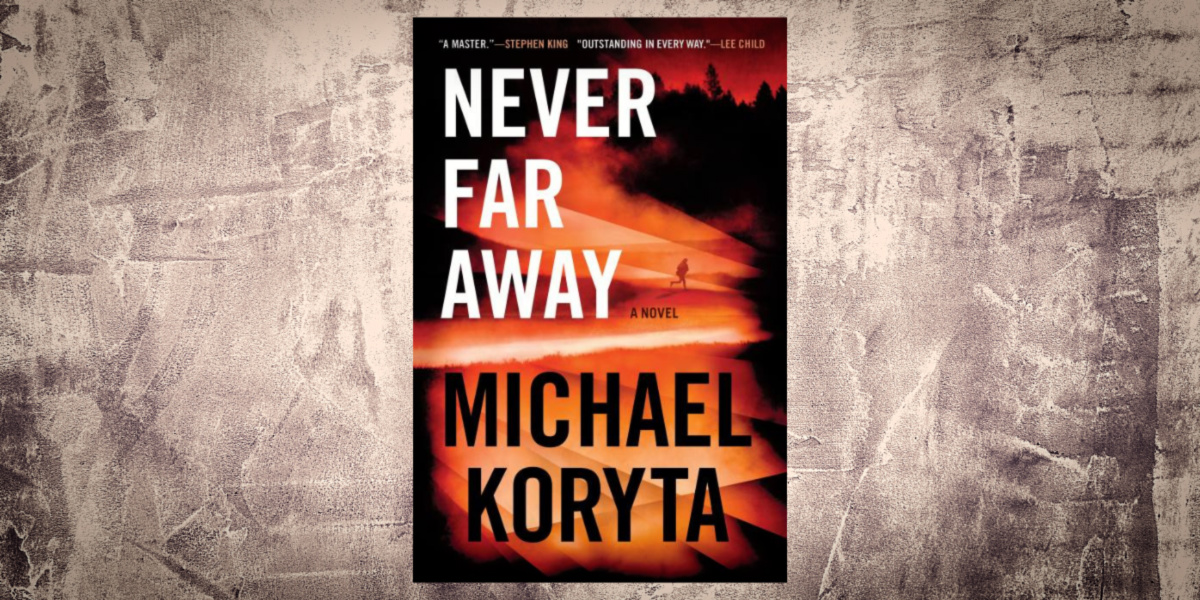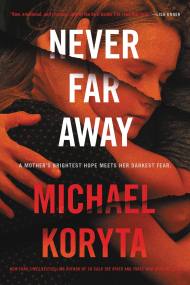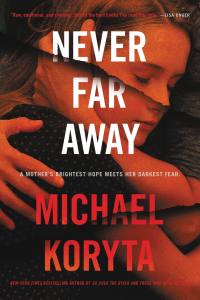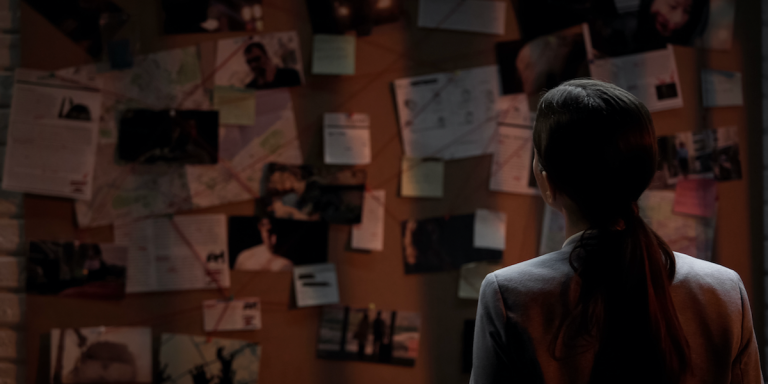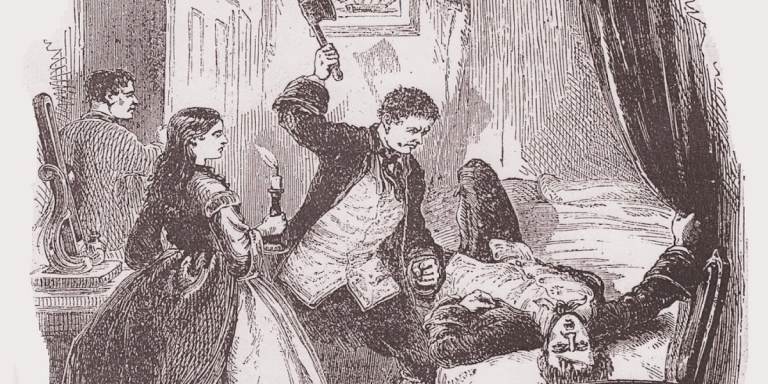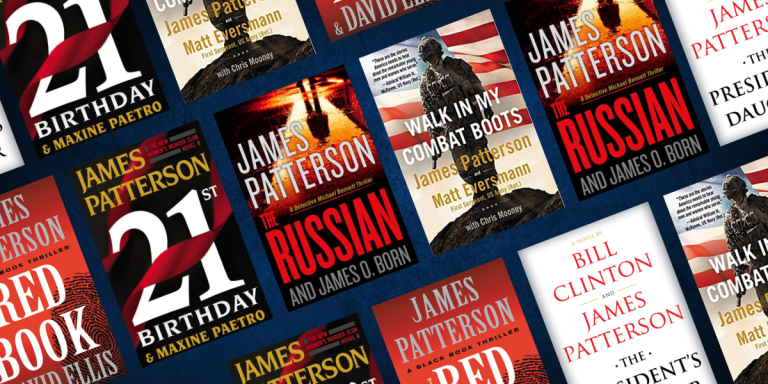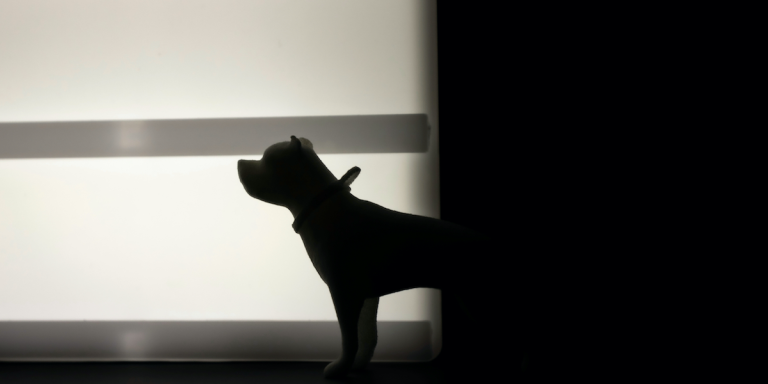Read The Excerpt: Never Far Away by Michael Koryta
Part One
The End
They circled her car with guns in hand, orbiting but never intersecting, like twin satellites of death.
Nina sat with her hands on the steering wheel and her eyes straight ahead. The tears had dried on her face. The shakes had stopped but her jaw ached from clenching her teeth. She watched them move and listened to them talk and she didn’t say a word. There was no point, and she understood this. They would make their decisions and then she would die.
They all understood this.
“Use the rifle and make it one shot,” the taller man said. He was lean and had long blond hair that fell nearly to his shoulders. He carried an AR-15 loosely in his right hand. Behind him, the headlights showed the lonely bridge and the river beyond. The wind was still and there was no sound but their voices and Nina’s rapid breathing.
“One shot?” the other man replied. He was a few inches shorter and layered with muscle, his hair cropped as tight as a military cadet’s, but he might have been the taller one’s brother. They looked eerily similar, in fact, as if superficial differences had been created simply to avoid confusion. They moved as one, spoke as one, breathed as one. “Why not open up, leave nothing but broken glass and shell casings behind?”
“Carnage,” the long-haired one said with a sigh. “You always favor chaos where cleanliness would work.”
They passed each other then, going in opposite directions, neither pausing to look at the other. Their eyes never left Nina. When their paths crossed, they seemed to quicken by a blink. You could never see them together for long. You had to turn left or right to track them, which meant you had to turn your back on one or the other. It all played out like a choreographed dance.
Nina stared at the road in front of her.
“It’s not chaos,” the clean-cut one said. “It’s a statement. That’s the idea.”
The headlights threw their shadows long across the cracked asphalt, turned them into supernatural figures that capered across the bridge and the surface of the water.
Nina wet her lips. Clenched and unclenched her hands on the steering wheel. Waited for them to choose.
“We weren’t asked to make a statement; we were asked to make her dead,” the long-haired one said. He had a nearly musical cadence to his voice, light and almost amused. Even as he circled, he watched Nina. She could feel his eyes on her, and she wanted to look away but refused to. Just look straight. If he passes, look him dead in the eye and let him carry on.
Until he was done carrying on. Until it was over.
“Single shot to the brain, then?”
Their shadows overlapped again. Nina could smell the river, the only cool thing in the stagnant Florida night. It was the loneliest road she had ever seen. A mile behind her was a sign that said the road was closed and the bridge was out. That sign was lying facedown now, sawed off at the base.
“It would be my preference,” the long-haired man said. He paused, stood dead center between the headlights, and stared at Nina. His right hand lifted and the gun muzzle rose with it and centered on her and held. His gloved finger stroked the trigger. He studied her for a long moment and then nodded. “Clean,” he said. “It would be clean and quick.”
“There will need to be blood,” the other one said, and Nina closed her eyes despite herself.
“Correct. Rather a lot of it too.”
“I’m afraid so.”
Nina forced her eyes open. Beads of sweat rose on her forehead, too cool, like the sweat when a fever broke.
They were standing as close together as she’d ever seen them. Not shoulder to shoulder, but aligned, at least temporarily, no more than a single pace apart. The river ran through their shadows. Neither of them moved and neither of them spoke. The sound of the river was a distant thing. Cicadas trilled and somewhere in the far distance there was a soft splash. An alligator, maybe.
“Your knife?” the long-haired man said.
His companion withdrew a knife from his pocket and flicked the blade open and passed it over. The long-haired man let the AR-15 muzzle drop again and walked toward the car at a leisurely pace. All the time in the world. He stopped beside the driver’s door and reached out and took the handle and pulled it open. Knelt. Looked at her.
“It must be done,” he said.
Nina nodded. She couldn’t speak.
He sighed and leaned his rifle against the back door of the car. Then, holding only the knife, he used his free hand to sweep his hair back from his face and looked up at her with what could almost pass for tenderness.
“I can do it,” he said. “Or—”
“Me.” The word left her lips in a gasp. She breathed and blinked and said it again, firmer this time. “Me.”
The long-haired man nodded. The other one had moved out of the headlights and stood watching from the shadows.
“I respect that,” the long-haired man said, then he rotated the knife so he was gripping it by the blade and passed it forward. Nina finally released the steering wheel and took the textured black rubber grip of the knife in her right hand.
The long-haired man leaned forward and reached for Nina’s hand. Instinctively, she jerked it back. He waited, patient. She extended her left hand to him, trying to will the shaking away.
It didn’t work.
He took her bare hand in his gloved hand, turned her palm up, and traced the fine blue vein that ran from the top of the wrist to the base of her middle finger.
“Cut deep, and across the track, not with it,” he said. “The blade is sharp. It won’t take much. Just remember to get to the headrest in a hurry. We wouldn’t want to create confusion.”
Nina’s heart rate was triple-timing and her breasts rose and fell with shallow breaths. She felt a wave of dizziness and for a moment thought she might drop the knife. She looked away from him and out toward the river and spoke aloud but to herself.
“Hailey,” she said. Then, after wetting her lips: “Nick.”
No one said a word when she brought the gleaming, angled blade to the inside of her left wrist and cut a furrow through the skin and deep into the vein.
She cried out then despite herself, the pain rising behind the blood, and the long-haired man said, “Hurry, now, hurry,” and she turned in the seat and reached for the headrest and held out her hand so her palm was open and skyward, like a desperate prayer.
The blood ran free over the tan leather and formed reservoirs and tributaries as it tracked down the headrest and chased the grooves of the leather back south. The dizziness returned and she started to pull away but he caught her by the elbow.
“More,” he said softly. “It has to be enough. You know this.”
She knew this. Hailey. Nick. Doug. She closed her eyes and let the blood run. Hailey and Nick, Nick and Hailey, and Doug was there, Doug was still there, Doug would always be there. She curled her hand into a fist and the open skin pulled farther apart and the blood ran faster.
“Good,” he said, and then her hand was back in his and a bandage was closed over the wound. He moved swiftly but gently, with the seasoned touch of a nurse. She felt her pulse against his thumb as he applied pressure to the wound.
“Up now,” he said, and he guided her out of the car. She opened her eyes just as the clean-cut man lifted a small flashlight and thumbed the back and a brilliant beam pierced the blackness and illuminated the tan leather.
Ribbons of blood gleamed jewel-like in the light. It was darkest on the headrest where the flow had begun but the tendrils snaked down and out and found their own routes. There was more blood than she’d imagined was possible from a single cut vein.
The light went off.
The long-haired man’s voice came from the blackness. “I don’t think that’s enough.” He said it with sorrow.
“No?” The light returned, capturing the scene once more.
“No. The blood is there. The blood is fine. But I’m thinking of him…the man has seen many killings. Executions. You know this.”
“You’re right.”
“Think blood will be enough for him?”
“Perhaps not.”
Nina breathed through her nose and felt her pulse throbbing in the cut and looked from one of them to the other, her heart rate spiking again.
“Hair,” the one who looked like a soldier said.
“A touch more than that,” the long-haired man answered.
Nina’s legs quivered, but she stood tall. Tried to betray no fear as she said, “What touch?”
The long-haired man sighed. “It would be most compelling—”
“And realistic,” his partner put in.
“If there was a hank of hair that also seemed to have…”
“An attachment point,” his partner finished for him.
Nina blinked. “What?”
“Flesh,” the long-haired man told her, his blue eyes looking black with the light hidden behind him.
Nina tried to lock her knees, but the dizziness came on fast then, and she shifted and parted her lips and sucked in the humid night air.
“Think of a bullet,” he told her.
“Of what it would do,” his partner said.
“Even if you’re gone, there’s a bit more than blood left behind.”
“Bone would be nice.”
“Bone would be ideal, but under the circumstances…”
“It’s a tough get.”
“Exactly,” the long-haired man agreed. “So we make do with what we have.”
The whole time speaking as if they were alone on the road, as if Nina weren’t listening to each terrible word. She stared at them, her eyes going from one to the other.
“May I?” the long-haired man said, and he lifted his hand. When she didn’t react, he reached out and traced a small circle on the back of her head, his fingertip barely grazing her skin. “It would go like that. I know you’re willing to go it alone, and as I said, I respect that, but it would be easier in this circumstance if—”
She handed him the knife. Said, “Hailey and Nick and Doug.”
“Yes,” he said. “Sure. Embrace whatever thoughts you need to have for your courage.”
“Hailey and Nick and Doug,” she repeated. The bandage on the back of her hand was already sticky. She lowered herself shakily to her knees, the pebbled asphalt biting through her jeans, and tried to draw up the images she needed. Her daughter’s face, her son’s, her husband’s.
“I’m ready,” she whispered, and bowed her head.
He cut so quickly that she scarcely felt it. For an instant, she thought that it was done and that it had not been so bad at all.
Then he yanked her hair.
It was a single, swift tug, and only as her flesh separated did she realize that he still had the blade to her head, was cutting and lifting even as he jerked.
Nina fell forward onto her hands and opened her mouth to let out a howl of pain and then a gloved hand clamped over her mouth and the long-haired man’s voice was in her ear.
“Shh, shh,” he cooed. “Can’t be too loud. Just in case.”
She saw red and black and a rotating world and sagged in his arms as he passed a hank of her hair and flesh back to his partner in exchange for an unwrapped bandage. He pressed it to Nina’s head and held it there as she rode the current of pain.
The second man stepped up and leaned past them and Nina saw the nickel-size layer of her flesh swinging from her own hair like a miniature scalp as he draped it judiciously into the blood she had already shed.
“Do it quickly,” the long-haired man said.
His partner drew a pistol from his belt and took aim and fired. The sound should have been loud but no sound could be loud against her pain. She sat on the pavement holding the bandage to her head and she smelled the cordite from the gunshot and blinked and refocused and saw the hole punched through the headrest.
The clean-cut man holstered the pistol and stepped back, tilting his head. Then he leaned forward again and nudged the small piece of Nina’s scalp with his index finger, tapping it into a position that pleased him. “It’s not great,” he said.
“Less than ideal circumstances,” the long-haired one said. “A bit of a time crunch.”
“Indeed. Still, the man has resources. What would convince a local lab might not be enough. He can fact-check if he wishes.”
“That’s what we’re here for. To discourage second opinions.”
His partner smiled, and Nina watched him and shivered despite herself.
They were empty men.
She had needed two like them, though. Yes, she had.
The long-haired man released her and stepped back. “I’d wear a baseball cap for a time if I were you,” he told her.
She put her palms against the pavement and pressed herself up, first into a sitting position, then all the way to her feet. The world spun. She waited. The world steadied. “Keys are in the car?” she said.
He smiled. The wind fanned his pale blond hair back over his shoulders. “Yes.” He nodded at the river. “Right over the old bridge. You couldn’t drive across it, but you can still walk it. Step carefully, though. I know he’s supposed to think you’re in the river, but it would be a shame if you actually ended up there.”
Nina nodded. Looked at the two men with their knives and their guns and her blood on their hands. “Thank you,” she said.
“Our pleasure.”
“Happy to help.”
Nina looked one last time at the blood-soaked headrest where her hair hung, then turned and walked into the night.
They watched her go. Only when she was across the bridge and the sound of an engine growled in the darkness did either speak.
“We would get more money if we told him the truth,” the long-haired man said finally.
“His money and hers.”
“Yes.”
“She’s of little use to us alive.”
“None whatsoever.”
They turned in unison and looked at the car. The shorter one thumbed the flashlight on again. The blood gleamed. The hank of hair with the circle of Nina Morgan’s scalp dangled beside the gunshot hole.
“I’m curious, though,” he said.
“Can we sell it. That’s what you’re wondering.”
“Exactly.”
“It was rushed work, yet…”
“Not bad.”
“No. Not terrible.”
“I can’t say I ever liked the man either.”
“The job in Mazatlán, for example.”
“We weren’t put in a position to succeed on that one, no.”
“There’s being considered expendable, and then there’s being sacrificed.”
“Very different situations.”
“Indeed.”
Silence. They studied the car.
“We’ll have to call it in,” the long-haired man said.
“Here’s a prediction,” his partner answered. “He won’t pay us.”
“Because she’s in the river, and we weren’t supposed to put her there?”
“Correct. He wanted to see her. So the bastard won’t pay us.”
The long-haired man gave a thoughtful nod. “In that case, the only sure money is Nina’s.”
“Unless we give her up.”
“Unless.”
“But even then…”
“He might not be happy.”
“Correct.”
The long-haired man removed his gloves. Studied the car. “It’s an experiment,” he said. “Can we sell it?”
“Why not try?”
“Why not?” the long-haired man agreed, and he took out his cell phone and dialed.
Part Two
Guardians
The wasp flew into the back seat of the truck at night, unnoticed.
Doug Chatfield had lowered the window earlier when he was driving home with his thirteen-year-old daughter, Hailey, in the passenger seat and his eleven-year-old son, Nick, sprawled in the back amid a tangle of baseball bats, gloves, cleats, and stink.
The kids were arguing when Doug pulled into the winding entrance road of the subdivision. Hailey took issue with what she termed Nick’s “totally rank BO.” Nick responded by peeling off one sweaty sock, lunging forward, and dangling it under his sister’s nose. That led to Hailey grabbing her brother’s hand and bending it backward, mercy-style. That led to a shriek of pain.
At this point, Doug Chatfield said, “C’mon, gang,” and cracked the back window even though it was just beginning to rain, fat drops sprinkling out of a nickel-colored sky behind clouds that promised more.
“Release your brother and let his stink blow south,” Doug said in the formal tone of a royal proclamation. The voice amused Hailey. Nick’s hand was freed, the sock fell onto the center console, Hailey swept it away with disgust, and the cracked rear window let the humid summer air pass over the fragrant cargo in the back seat. Not much air, though; Doug had cracked the window only about an inch due to the rain. Cracked it so little, in fact, that he didn’t remember it was open at all by the time he pulled into the garage.
The wasp was already in the garage. It had flown in when Doug exited the house to go to work at his accounting office that morning, and it was sealed off from its nest under the eaves when he put the door down. When the Chatfield trio climbed out of the truck, the wasp crawled onto a dusty blue plastic tub that held Christmas lights. By the time it finally took flight, the garage door was down once more, and escape wasn’t an option.
Sometime around midnight, it found the cracked window.
On Saturday morning there was neither work nor practice nor alarms in the Chatfield house. No demands on the family until two p.m., when Hailey had tennis, and four p.m., when Nick had another baseball game—both activities weather-dependent. The storms that had rocked the Louisville area overnight had saturated the ground but hadn’t broken the humidity, and there was a chance of more rain that afternoon. When Doug woke, the sky was dark, and on the back porch, where he stood with coffee in hand, the air was so thick it seemed to have texture, like passing through a curtain.
They’ll be inside all day, he thought with confidence. It will be a day of closed windows and air-conditioning and TV and video games and at least one battle between them, maybe two.
Get things off on the right foot, then. A treat, a surprise. Doug was usually a big proponent of healthy breakfasts, the one meal he felt he had total control over on days that could so quickly devolve into chaos and crammed schedules. He was a big proponent of most things health-related, actually, because at one time he’d been a physician’s assistant. Now he tried to pass himself off as a hypochondriac to explain away the medical knowledge that occasionally leaked out. “Degree from WebMD,” he’d joke, and people would smile and accept it, because everyone knew that Doug Chatfield was an accountant and a widower. Who could blame him for being paranoid about his family’s health? He was all alone in this.
A balanced breakfast was mandatory on most days, but this was summer vacation, it was Saturday, and his kids were looking at a rainout. There was a Dunkin’ Donuts three minutes up the road. Hailey was a jelly-doughnut fan and Nick was a chocolate-anything kid. Doug could get to the Dunkin’ and back in ten minutes, have the box waiting on the kitchen island whenever the kids woke and wandered downstairs.
What the hell. They called it vacation for a reason.
He left a note on the island just in case one of them woke while he was gone, unlikely as that was. One word, with an exclamation mark: Doughnuts!
He rarely left them alone, but they’d be fine, and it was good practice. This was, as he’d discussed with Hailey repeatedly in recent weeks, the summer he wanted her to take more of the responsibility she was constantly demanding. She was convinced that she was already an adult—Thirteen going on thirty was the tired joke in the bleachers at the tennis matches—and that Doug smothered her, was an overprotective, clueless dad.
Maybe she was not entirely wrong. Any parent knew the wicked risks this world held for children, but Doug could conjure up more creative risks than most. He had to push back against those fears, those memories. You couldn’t bubble-wrap your kids against the world.
But you could give them treats.
Let it rain, and let them sleep late, and let them eat doughnuts.
He grabbed his keys and went into the garage. Started the truck and put up the door. Backed out, put the door back down, and pulled away. Only then did he hear the high whistle of air through the cracked window behind him and remember the body-odor battle of the previous day.
He shut the window without a glance in the back seat.
His house was a mile deep in the winding roads and culs-de-sac of a subdivision composed of brick homes striving for visual separation without much success. The speed limit was fifteen miles per hour inside the subdivision, and Doug adhered to it. You had to, with all the kids in the neighborhood. Kids did crazy things—chased Frisbees into streets, chased dogs into streets; hell, chased cars. They didn’t understand risk. Not yet. So you drove slow, and you paid attention.
He was at the stop sign near the low stone fence bearing the neighborhood’s name—Flanders’ Woods—when the wasp crawled from the door panel of the back seat to the driver’s-door panel in the front.
Doug didn’t see it. His eyes were ahead, on the road. There was no stop sign for cross traffic, and people drove too damn fast on this stretch. The hill to the east was particularly problematic in the morning, when the rising sun glared down on the crest and made visibility difficult. He paused for several seconds, making sure that he was clear, and then turned left.
Now he was on Oak Ridge Road, where the speed limit rose to forty-five, except for the S-curves, where it dropped to thirty. One mile down this road, one more stop sign, and then he’d be on Fourth Street, and the Dunkin’ Donuts would be visible.
He pressed down on the gas pedal.
An American wasp is adorned with bright yellow and black bands. The colors are frequently adopted by sports teams and even warships for a reason—it’s an aggressive visual pairing.
It is supposed to be.
The colors are intended to sound an alarm and provoke a primal response. Don’t touch me. Don’t even come close to me.
For those who cannot see the warning, though, or those who see it and choose not to take it seriously, the female wasp is equipped with a second protective measure: a stinger. Unlike a bee’s barbed stinger, the wasp’s is smooth, capable of multiple stings. Only the female wasp has a stinger because she has the burden of protecting the nest, and she remains close to it.
Order Now
Nina Morgan’s bloodstained car was found a decade ago on a lonely Florida road. Forensic evidence suggested she’d been murdered, although her body was never found. Her disappearance left her infant children to the care of their father.
Once a pilot, mother, wife, and witness to a gruesome crime, Nina had to flee her old life to save her family. She reinvented herself as Leah Trenton, a guide in the Allagash Wilderness in northern Maine. She never expected to see her children again, but now tragedy has returned them to her—only they have no idea that she’s their mother—and delivered all of them back into danger. “Aunt Leah” will need some help, and an old ally has a suggestion: an enigmatic young hitman named Dax Blackwell.
By clicking 'Sign Up,' I acknowledge that I have read and agree to Hachette Book Group’s Privacy Policy and Terms of Use
